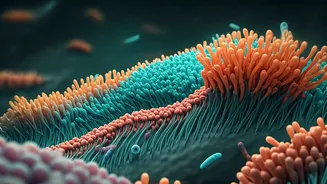Hydration: The Foundation
Maintaining proper hydration is vital for gut health, acting as the very foundation for a well-functioning digestive system. Water helps transport nutrients,
eliminate waste, and keeps the gut lining healthy and strong. When you’re well-hydrated, your body can effectively absorb nutrients from the food you eat and efficiently remove toxins. Dehydration, on the other hand, can lead to constipation and other digestive issues, creating an imbalance in your gut. Drinking enough water supports a diverse and healthy microbiome, the community of microorganisms that live in your gut. Water aids the growth of beneficial bacteria, which are crucial for overall health. Aim for consistent water intake throughout the day to support optimal gut function. This helps prevent digestive discomfort and supports the overall health of your body. Remember, hydration is the first step toward a healthier gut and a happier you.
Probiotics: Friendly Allies
Probiotics, which are beneficial bacteria, play a crucial role in maintaining a balanced and thriving gut microbiome. These helpful microorganisms aid in digestion, boost the immune system, and compete against harmful bacteria. They can be found in fermented foods like yogurt, kefir, and certain types of pickles. Incorporating probiotic-rich foods into your diet regularly can increase the population of good bacteria in your gut. Probiotics contribute to better nutrient absorption and help to break down food, ensuring that your digestive system functions smoothly. They support a robust immune response by fortifying the gut barrier, making it more difficult for pathogens to enter the body. Supplementing with probiotics can be especially beneficial after taking antibiotics, which can deplete the good bacteria in your gut. Prioritize the inclusion of probiotics to promote a healthy gut environment, leading to improved overall health and well-being. Probiotics are your friends in the fight for a healthier you.
Mindful Eating Practices
Mindful eating is a powerful tool for improving gut health and overall wellness, encouraging a more conscious and deliberate approach to eating. It involves paying full attention to the experience of eating – the taste, texture, and smell of your food – without distractions. Eating mindfully can help you recognize your body’s hunger and fullness cues, preventing overeating and supporting healthy digestion. By savoring each bite, you allow your body to properly break down food and absorb nutrients, which optimizes your gut’s function. Practicing mindful eating includes chewing food thoroughly, which assists in digestion and eases the workload on your digestive system. It also means eating without distractions like phones or television, which allows you to be fully present with your meal. Over time, integrating mindful eating can lead to improved gut health and a deeper connection to your body’s needs. The practice can decrease stress, which frequently impacts the gut, and it supports a healthier relationship with food. Embrace mindful eating to support your gut and cultivate a healthier lifestyle.





















